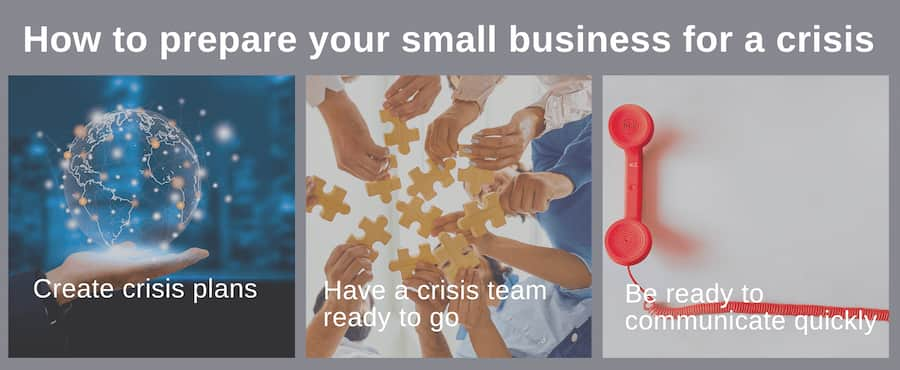How to Prepare Your Small Business for a Reputational Crisis

To run a successful small business that thrives in the modern market, you must prepare for anything. Assuming that the economy will remain stable and that your business will never encounter a major hurdle is a recipe for disaster! As a smart business owner, you need to know how to prepare your small business for a crisis that can come in many potential forms.
What is crisis management in business?
In a nutshell, crisis management in business is the practice of:
- Anticipating potential crises your business might encounter based on the overall economy, its industry, and related factors
- Creating plans to manage those crises should your business ever encounter them
- Enacting those plans if and when it’s necessary
That’s easier said than done, of course. But it’s a good idea to master this crisis management sequence as a business owner, no matter your experience level or the size of your entrepreneurial endeavor.
For instance, if you anticipate a potential decrease in available labor due to things like another pandemic, you can plan for that crisis by:
- Offering incentives for your current workers to keep them at your business
- Making early transitions toward remote work setups so your employees can continue producing value for your business even from afar
- And so on
You can’t anticipate every crisis, of course. But considering what crises your business is most likely to encounter will go a long way toward ensuring business resiliency or endurance in the face of difficulties.
Examples of business crises
Business crises can appear in many forms and lead to different strains for your organization. Here are some examples:
- Employment issues, such as many employees leaving or being laid off because of budget concerns
- Natural disasters, which can damage infrastructure and affect consumer spending habits
- Cyber security attacks, which can compromise customer or important business data and lead to fines or future security concerns
- Employee misconduct crises, in which one or more (especially high-level) employees do something that gets them in trouble with the public or the law
Some types of business crises are more likely in certain industries than others. For example, suppose you run a business in food service, like a restaurant business. In that case, you’re more likely to run into a supply chain crisis in which your supply chain business deals fall through, causing you to be out of a core food product or ingredient for a while. You’ll then need to scramble to solve the issue and continue to provide your customers with what they desire.
How to prepare for a business crisis
While business crises can be difficult to anticipate and manage, there are ways in which you can prepare for future disasters. The more preparations you undertake, the better equipped you’ll be to face a business crisis if and when it appears.

Create crisis plans
First, always create dedicated, thorough crisis plans for each hypothetical scenario you think your business will encounter. The more detailed your crisis plans are, the faster you can implement helpful steps and solutions to stop the proverbial bleeding.
A thorough crisis plan should include the following:
- A breakdown of core team members responsible for handling the crisis
- An analysis of what the crisis plan will cost
- A timeline for the crisis plan and its objectives (i.e., when the crisis should be “handled if the plan is implemented correctly)
Have a crisis team ready to go
Next, draw up and staff a crisis response team for future issues. For example, if your brand anticipates future PR crises because of product manufacturing errors or other problems, you need to have a designated PR manager to handle public communications and draft messages to your customers. You’ll also want to designate social media officers, brand ambassadors, and other important personnel ahead of time so everyone knows what they have to do if a crisis appears.
Alternatively, know what outside organizations, such as reputation management organizations like Reputation X, you’ll use to handle the crisis ahead.
Be ready to communicate quickly
In keeping with the above, be prepared to communicate to your core stakeholders and consumers quickly in the event of any crisis. More than anything, customers and stakeholders want to know that you have the situation under control and are working on a solution (even if you are still figuring out what exactly that solution is).
People don’t like brands to appear indecisive or like they don’t know what to do. Communicate quickly and with a message of confidence and decisiveness, and the crisis will be much easier to handle, especially if it is social in nature.
Establish an emergency line of credit
Many business crises can drain your finances. In some cases, your finances themselves can be the source of your crisis situation, such as running out of money to pay your employees in the earliest days of your small business.
That’s why you might want to consider establishing an emergency line of credit with a reputable bank or lender (here are some options). An emergency line of credit, whether it’s a credit card, a business bank account that comes with features like automated saving or perk points, or a loan, can help you keep money flowing to people and customers when needed, ensuring that your business stays afloat even amid a terrible economic situation.
Establish that emergency line of credit now when your finances are stable, as it will be more difficult to establish emergency credit during a crisis.
Stash extra income for economic upheaval
Similarly, stash any extra income you don’t need for business operations or expansions in anticipation of future economic difficulties. The more money you can stash in your war chest, the better prepared you’ll be for any financial hardships that may come later on.
It’s tempting to pay yourself a massive bonus or to spend the money frivolously. But being wise with any surplus profits you make now will more than pay off in the long run.
Wrap up
Ultimately, crisis preparation means anticipating, planning, and acting if and when a disaster appears. With the right preparation, your business can weather any economic storm and stay profitable even when other enterprises flounder.
